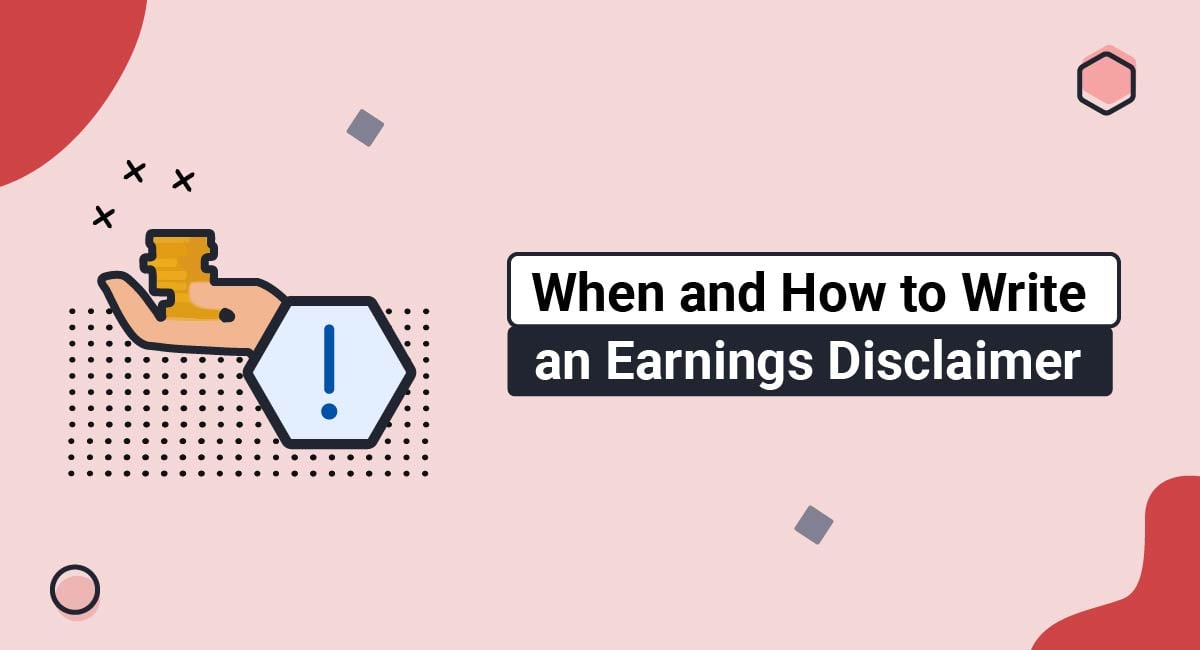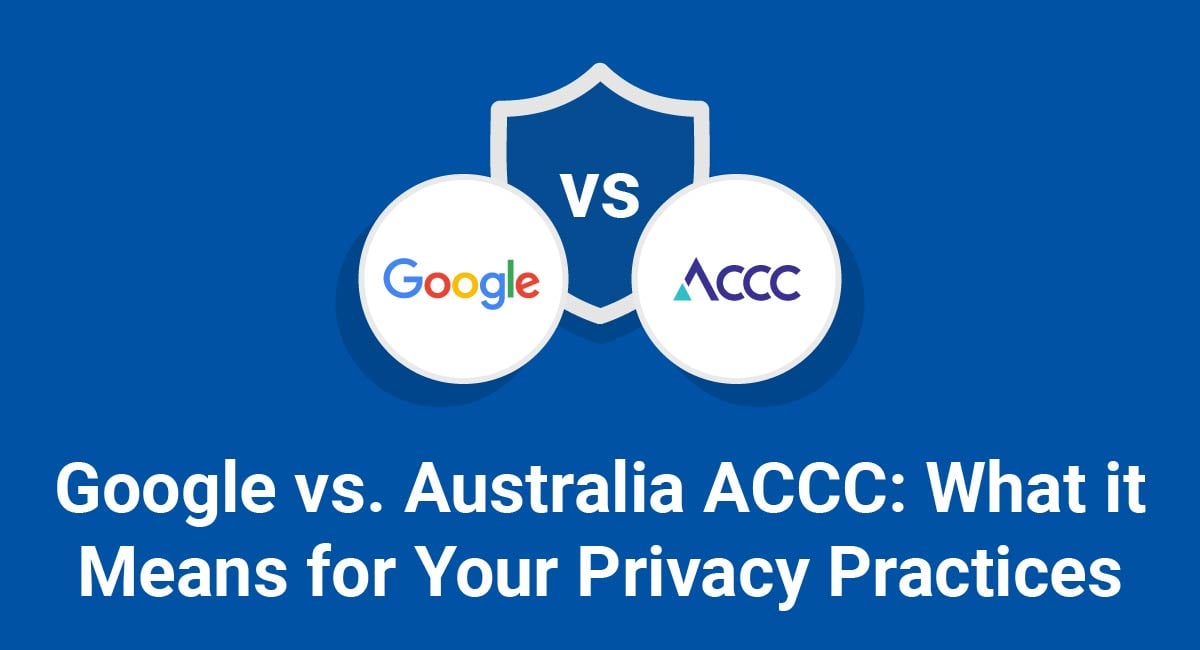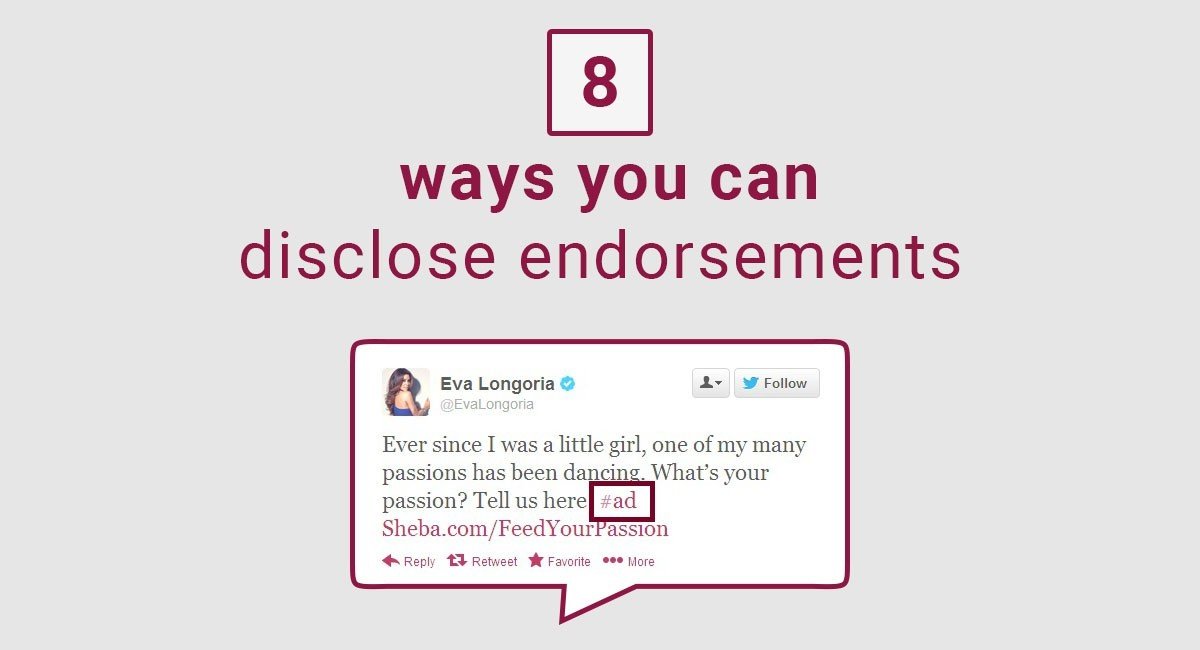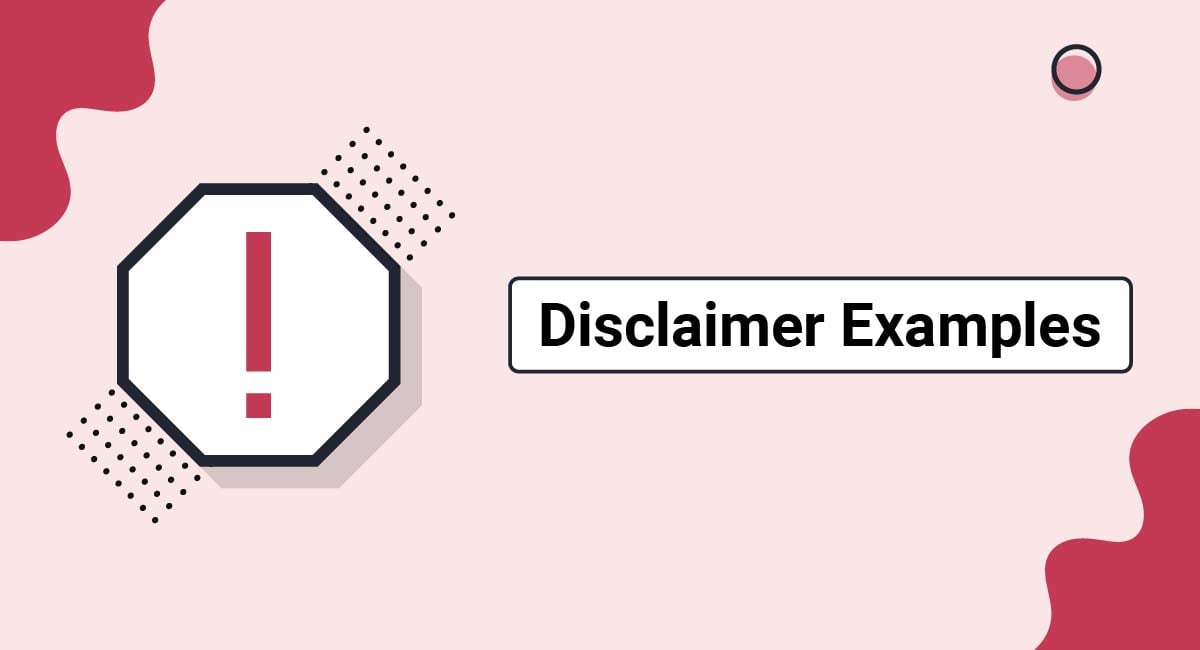Multi-level marketers, businesses that offer financial or investment advice, and any companies that claim that their products or programs can help users make money should maintain earnings disclaimers on their websites.
This article explains what an earnings disclaimer is, the difference between earnings and affiliate disclaimers, how to write your own earnings disclaimer, the legal requirements for earnings disclaimers, and where to display an earnings disclaimer.
Our Disclaimer Generator can generate a legal disclaimer for your business, website or mobile app. Just follow these steps:
-
At Step 1, select where your Disclaimer will be used.
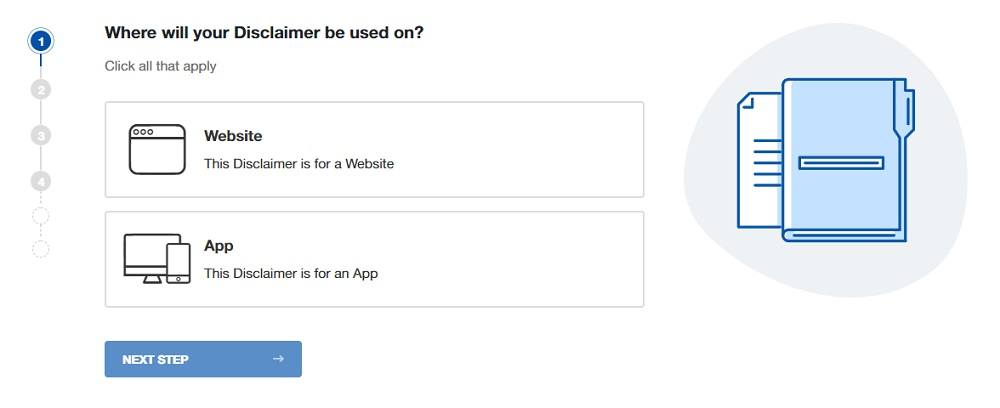
-
At Step 2, add in information about your website/app and business.
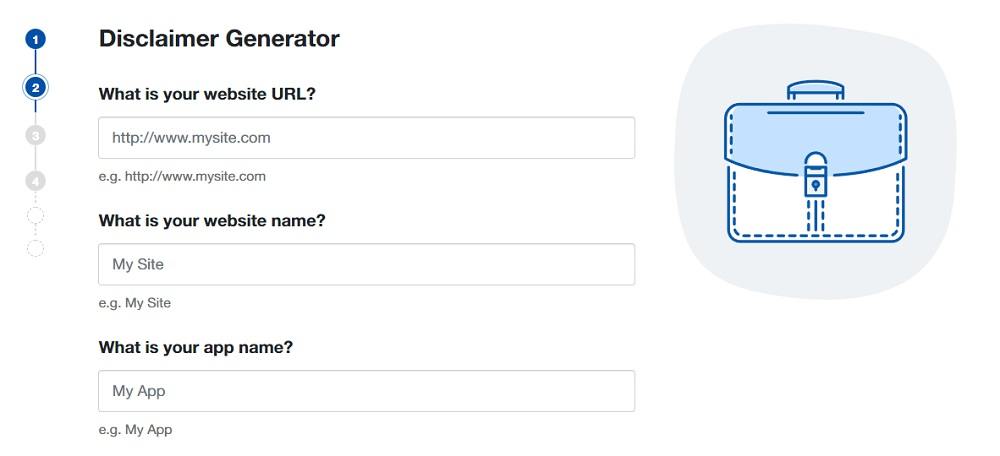
-
Answer some questions about your business practices.
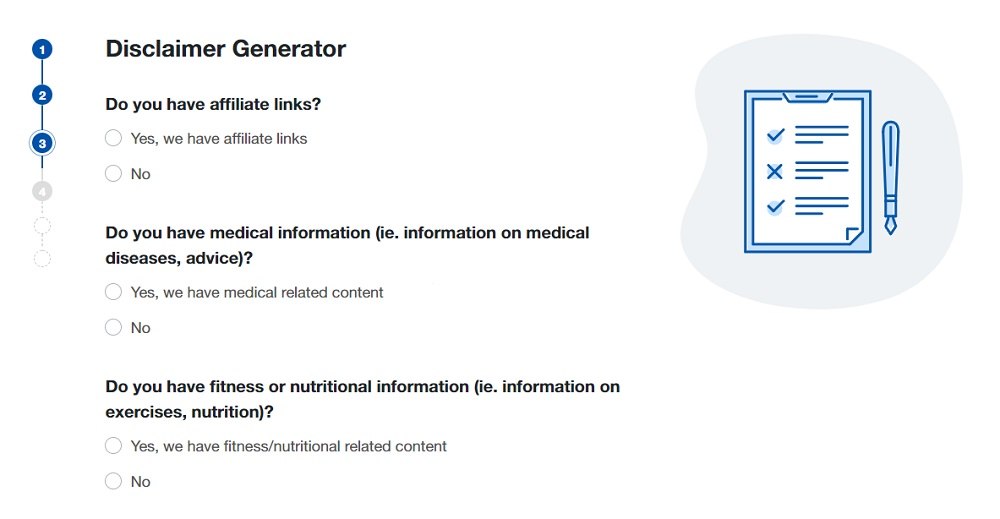
-
Enter an email address where you'd like to receive your Disclaimer and click "Generate."
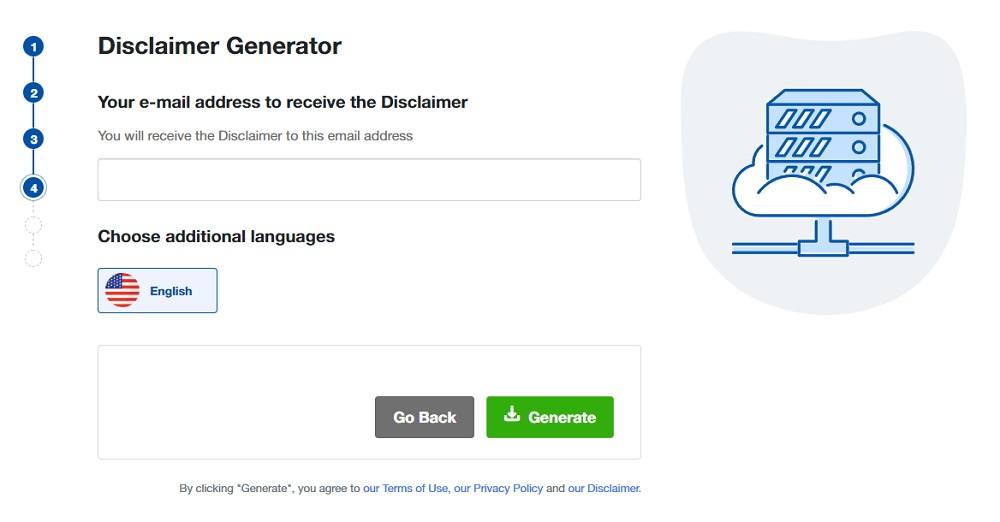
Done! You'll be able to instantly access and download your new Disclaimer.
- 1. What is an Earnings Disclaimer?
- 2. What is the Difference Between Earnings Disclaimers and Affiliate Disclaimers?
- 3. How Do You Write an Earnings Disclaimer?
- 3.1. Explanation That Earnings are Not Guaranteed
- 3.2. Description of Factors That May Affect Results
- 3.3. Use at Your Own Risk Warning
- 3.4. Warranties Information
- 3.5. Statement of Agreement
- 4. Legal Requirements for Earnings Disclaimers
- 4.1. United States
- 4.2. United Kingdom
- 4.3. Europe
- 5. Where Should You Display an Earnings Disclaimer?
- 5.1. Website Footer
- 5.2. Anywhere You Make Earnings Claims
- 6. Summary
What is an Earnings Disclaimer?
An earnings disclaimer (also referred to as an income disclaimer) is a statement that explains that income is not guaranteed through the use of a promoted product or service. It lets users know that they must have specialized knowledge and/or take certain actions in order to make money using the advertised strategies, products, or services.
Businesses should have an earnings disclaimer in place on their websites before:
- Offering financial advice or information
- Offering products, services, or programs designed to teach users how to make money or increase earnings
- Sharing users' testimonials about earning potential associated with your products or services
Amy Porterfield's earnings disclaimer explains that she gives no guarantee that users will earn money from using the techniques or ideas on her website. It goes on to say that the results portrayed on her website and other channels are not indicative of users' average experience and that users' results depend on other factors such as personal effort and experiences and market changes:
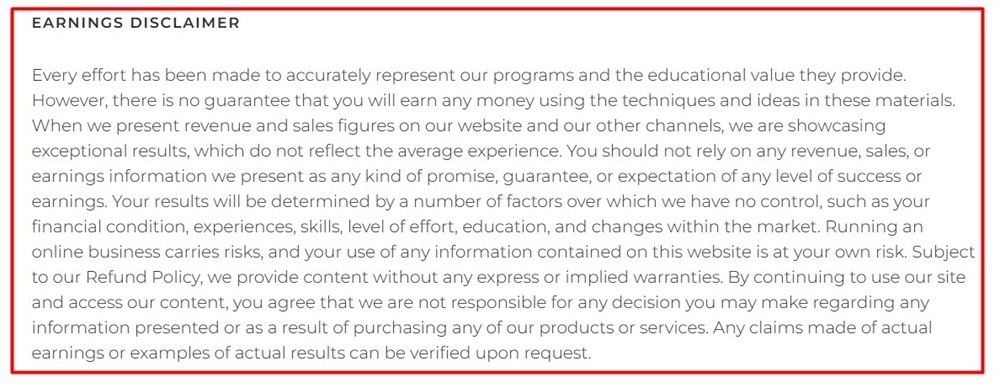
What is the Difference Between Earnings Disclaimers and Affiliate Disclaimers?
Earnings disclaimers explain that earnings are not guaranteed while affiliate disclaimers inform users that the website owner may receive compensation for mentioning a third-party product.
An earnings disclaimer lets users know that any earnings claims you make about a product or program are not necessarily indicative of anyone else's earning potential.
An affiliate disclaimer is used to let website visitors know that you may be compensated in exchange for mentioning or promoting a third party's products or services.
Affiliate disclaimers are also commonly referred to as affiliate disclosures. Although they are often used interchangeably, the words "disclaimer" and "disclosure" technically have different meanings. A disclaimer typically helps protect a business from liability, while a disclosure provides information.
Websites and blogs that promote products or programs or offer financial advice often maintain both earnings and affiliate disclaimers.
The Money Advantage's earnings disclaimer tells users that past users' success is a demonstration of what is possible but is not a guarantee for other users' success. It explains that it gives no earnings guarantees and that users' success depends on factors outside of its control, such as personal effort and market conditions:
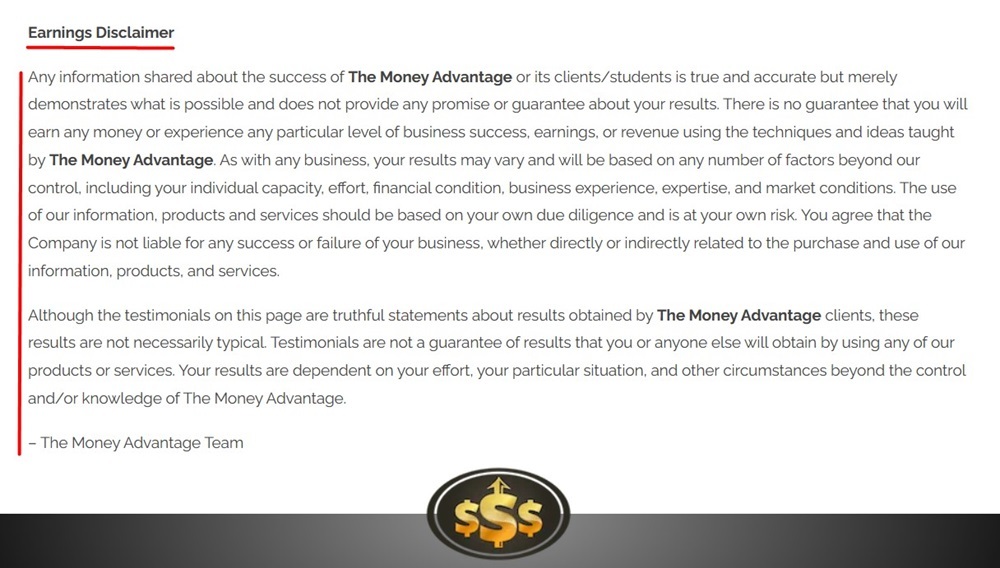
The Money Advantage's affiliate disclaimer explains that it makes a commission when users buy products that are linked or sold on its website and that it will not cost extra for users to purchase those products:
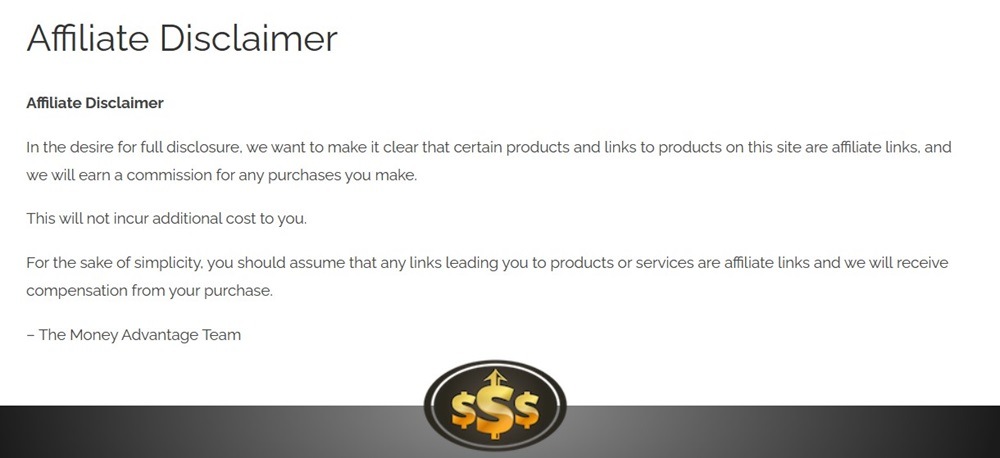
How Do You Write an Earnings Disclaimer?
There are a few key elements your earnings disclaimer should contain, including an explanation that monetary results are not guaranteed and a description of the factors that may apply in determining users' results.
Let's take a look at the information you should put in your earnings disclaimer to help make sure your bases are covered.
Explanation That Earnings are Not Guaranteed
Your earnings disclaimer should explain that earnings are not guaranteed and that results used for advertising purposes do not necessarily reflect the average user's experience. You should explain that past financial results do not necessarily predict future success.
Build Assets Online's earnings disclaimer states that it does not guarantee any income or form of success and that it is not responsible for any failures or losses that may occur in relation to its website, courses, videos, or podcasts:
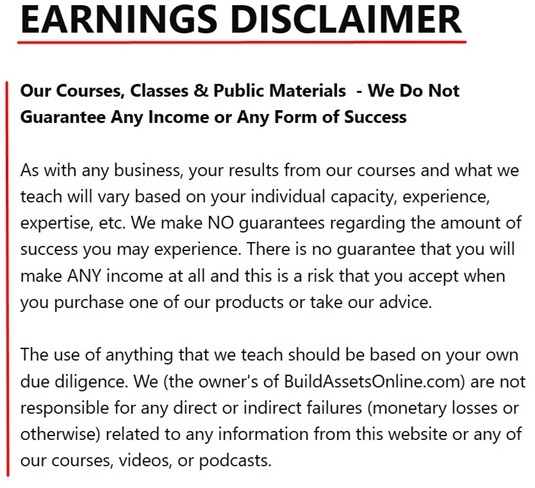
The Inspiration Place's earnings disclaimer explains that users' past successes do not guarantee other users' future success:
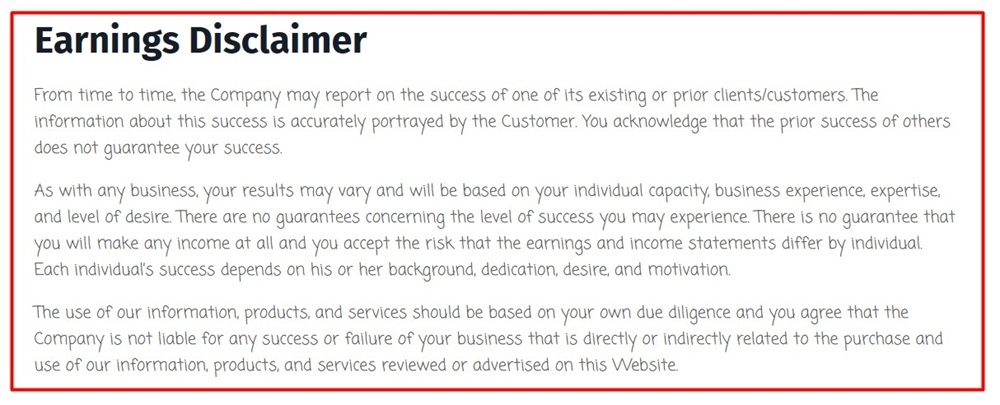
Description of Factors That May Affect Results
Your earnings disclaimer should let users know that there are many factors that can affect how much money they can earn using your information, products, or programs.
Factors your earnings disclaimer might contain include:
- Education
- Experience
- Skills
- Market changes
- Level of effort
- Personal finances
TaxProMarketer's earnings disclaimer lists factors that may affect users' success, including the amount of time users invest in its program, and their personal finances, knowledge, and skills:
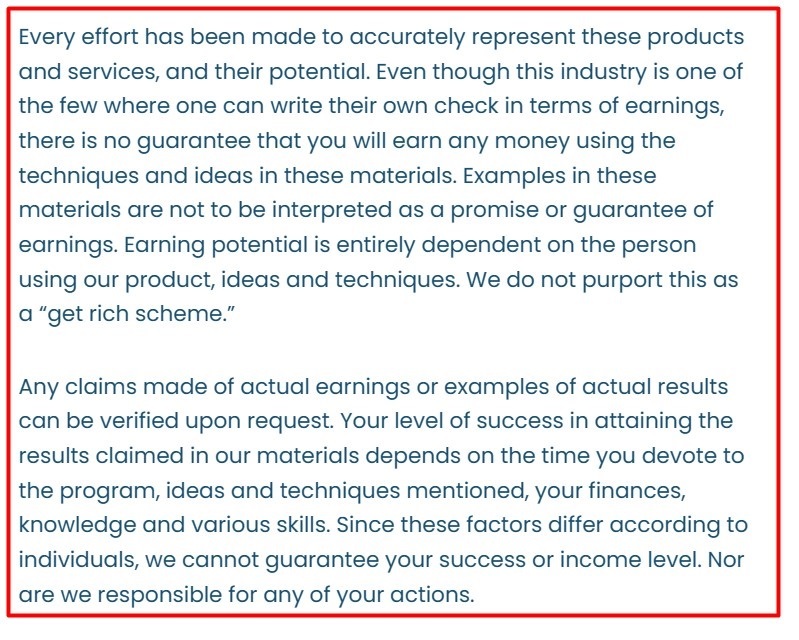
REI BlackBook's earnings disclaimer explains that there are several factors that come into play when determining a user's success, including the economy and the user's personal background, work ethic, level of commitment, and business skills:
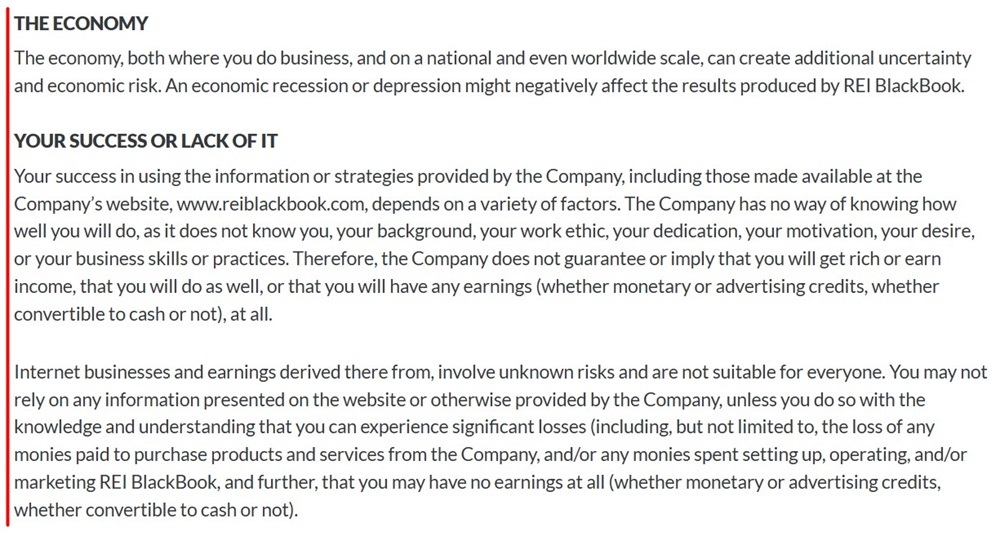
Use at Your Own Risk Warning
While businesses often maintain a separate Use At Your Own Risk Disclaimer, it's not a bad idea to include this warning in your earnings disclaimer. You should explain that users need to be aware of and take responsibility for any risks (including financial loss) associated with using your product or service or following your advice.
a>
Mindfulness Exercises' earnings disclaimer informs users that they must assume responsibility for all risks related to their use of the information it provides:
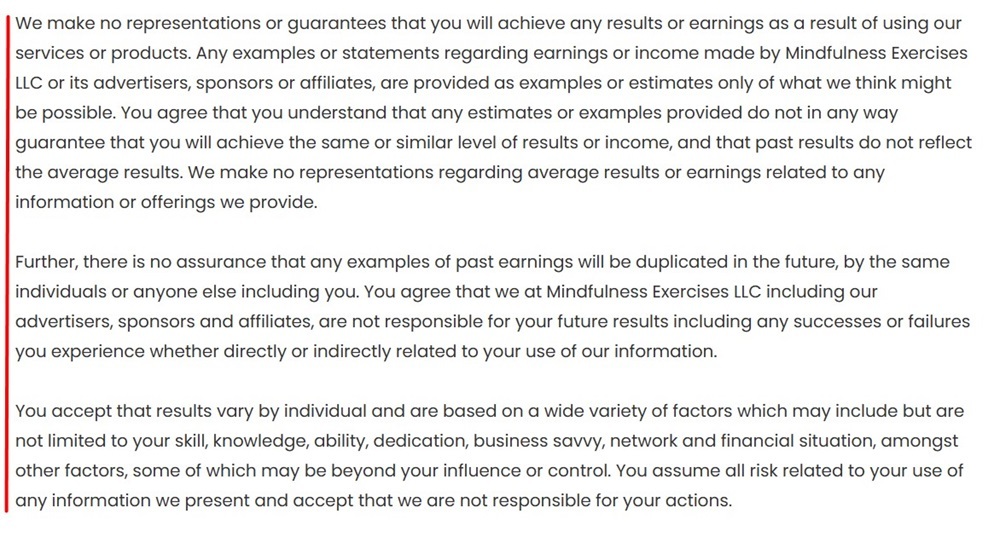
Jody Milward's earnings disclaimer says that she makes no income guarantees and that users must accept the risk associated with using her products and services:
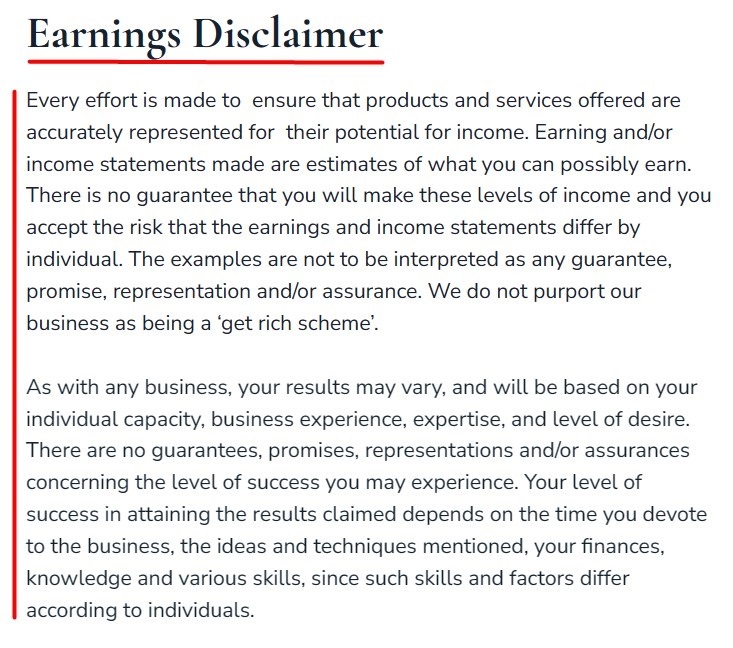
Warranties Information
Another stand-alone disclaimer that businesses often use is a warranty disclaimer.
A warranty disclaimer lets users know that you offer no warranties or guarantees of any kind, or describes the limited warranties or guarantees you do provide.
You can include a brief statement within your earnings disclaimer that explains whether or not you offer express or implied warranties of any kind.
Priority VA's earnings disclaimer explains that its products typically come with a conditional 30-day guarantee, but that it gives no earning potential guarantees:
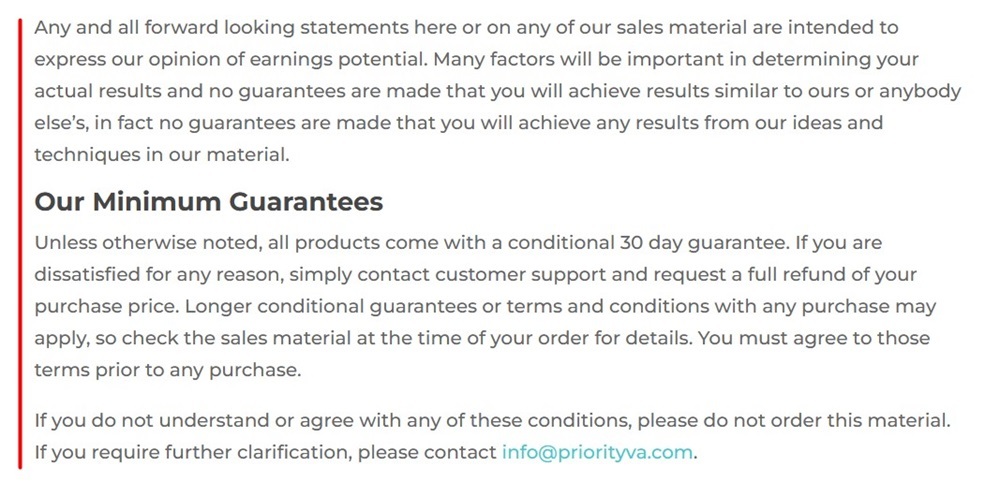
Contrarian Thinking's earnings disclaimer states that it makes no warranties that its products or services will produce expected results:
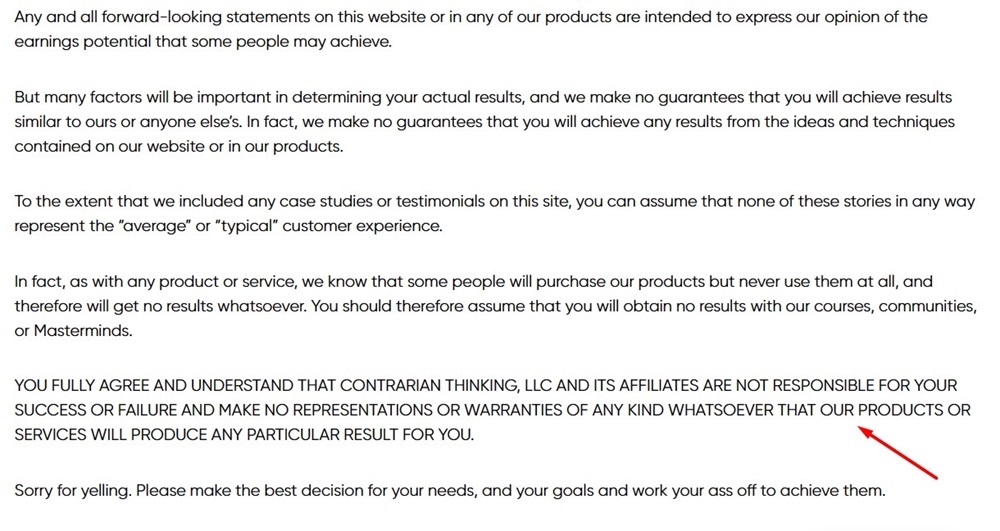
Statement of Agreement
Your earnings disclaimer should contain a reminder that by using your website, app, program, product, or service, the user is agreeing to release your business from liability for any potential financial losses.
Short Term Rental Secrets' earnings disclaimer states that users must agree that the company is not responsible for their success or failures in association with its program:
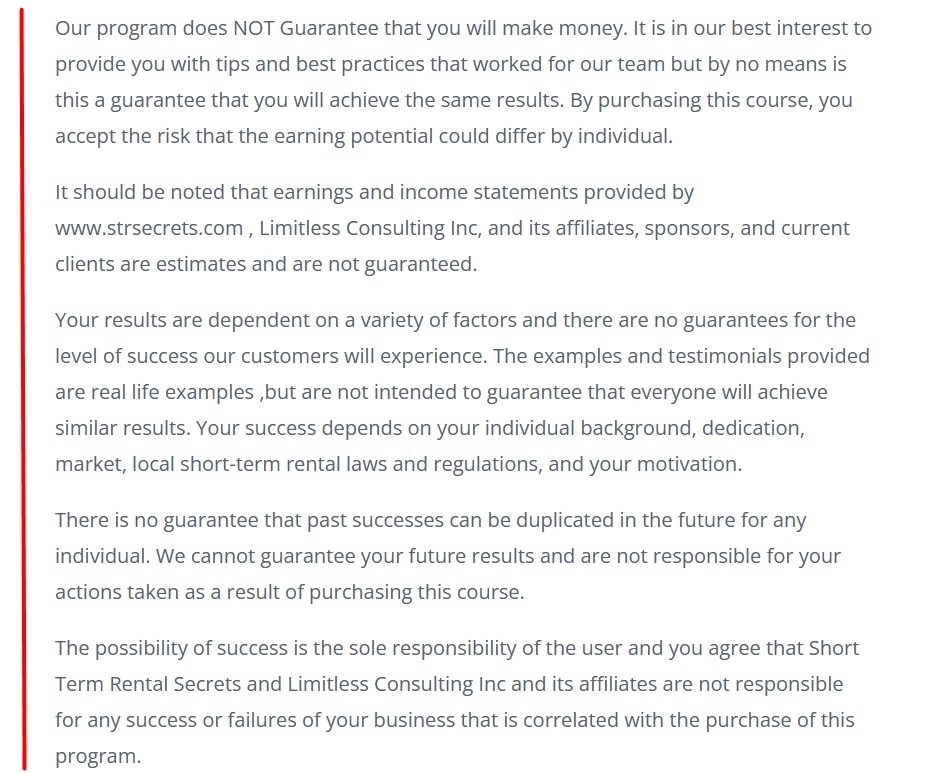
LoveLakeland's earnings disclaimer explains that users must agree to take responsibility for any business or internet risks that may reduce their results:
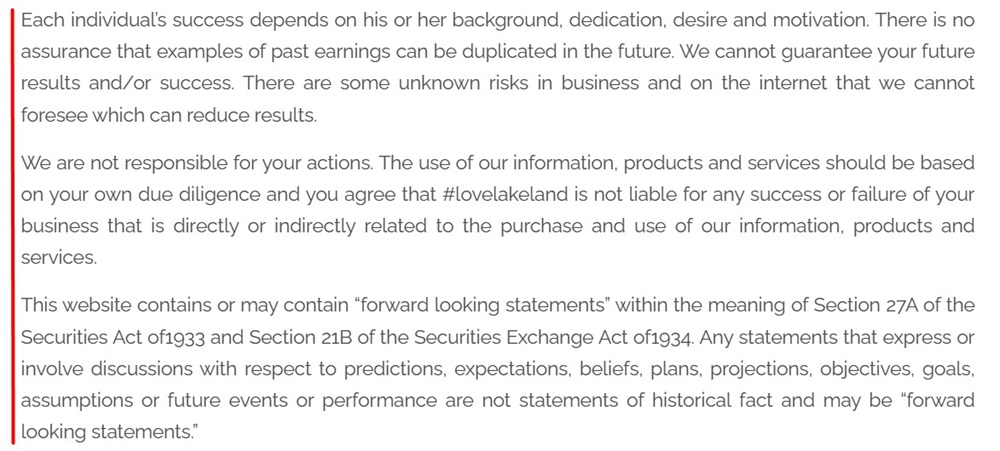
Legal Requirements for Earnings Disclaimers
Legal requirements for earnings disclaimers depend on where your business and/or users are located.
United States
The Federal Trade Commission (FTC) is the primary enforcing authority in the United States (US) as far as earnings disclaimers go. The Federal Trade Commission Act is the primary rule requiring earnings disclaimers.
Section 5 of the FTC Act prohibits "unfair or deceptive acts or practices in or affecting commerce."
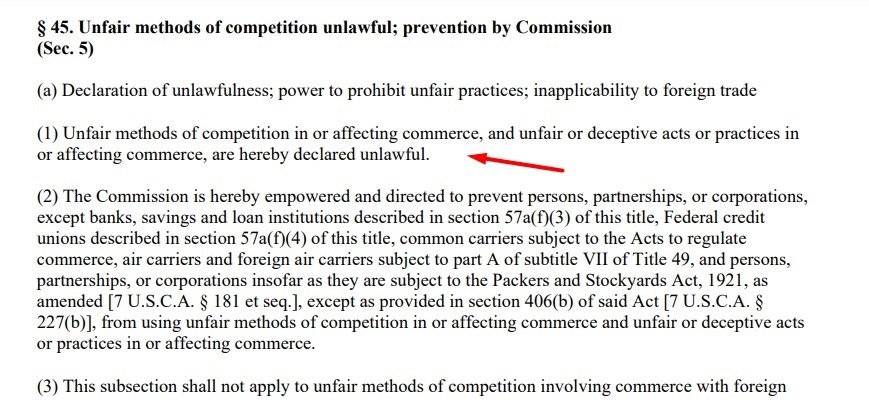
The following types of business practices are considered illegal under the FTC Act:
- False representations
- Misleading cost claims
- Sales that don't include appropriate disclosures
- Bait-and-switch practices (selling something that isn't actually available)
- Not honoring warranties
You or some of your users may experience increased earnings when using your product or service. However, if you advertise their testimonials or make claims about your or past users' earnings success, you may need to maintain an earnings disclaimer to explain context. Otherwise, those claims or testimonials could be considered deceptive acts under the FTC.
The FTC issued a Notice of Penalty Offenses Concerning Money-Making Opportunities in 2021. The document says that making a false, misleading, or deceptive statement about how much users could earn in a money-making opportunity counts as an unfair or deceptive business practice under the law.
The following misrepresentations are illegal under the FTC Act:
- Telling users that they will likely earn more income than the cost of participation in a money-making opportunity
- Stating that a "substantial number" of users have made or can potentially make a profit
- Saying that participants can make more earnings than most participants typically earn
- Saying that participants are likely to earn a specific amount
- Misrepresenting that exceptional earnings portrayed are typical
- Not disclosing any conditions or limitations that could affect earning potential
- Stating that sales of a money-making opportunity will be made to a limited number of users, or that users must act immediately to participate, when in reality sales will be made to anyone who will purchase the money-making opportunity
- Saying that users don't need experience to earn income
- Saying that a money-making opportunity is low-risk or risk-free
- Misrepresenting a sales position as a money-making opportunity
- Misrepresenting the amount or types of training participants will receive in a money-making opportunity
Section 1 of the FTC's Notice of Penalty Offenses Concerning Money-Making Opportunities describes unfair or deceptive trade practices under the FTC Act, including misrepresenting that participants in a money-making opportunity will be able to make more than the cost of participation:
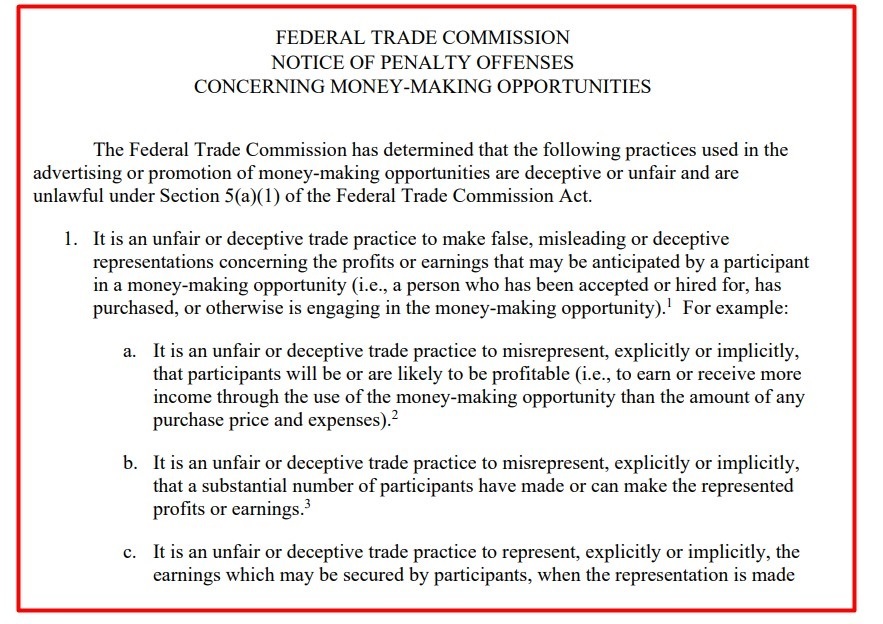
United Kingdom
The United Kingdom's (UK) Consumer Protection from Unfair Trading Regulations (CPR) bans unfair business practices. It requires companies that provide money-making opportunities or information to UK consumers to maintain professional diligence and refrain from misleading consumers about their products or services.
Unfair business practices under the consumer regulations include:
- Infringement on professional diligence (standard of care) requirements
- Anything that affects (or could likely affect) a consumer's economic behavior
- Misleading consumers (either through action or omission)
- Aggressive practices
- Banned commercial practices listed in Schedule 1 to the CPR
Companies that offer money-making opportunities in the UK or advice that could affect UK consumers' financial decisions should maintain earnings disclaimers on their websites. Earning Disclaimers for UK consumers should clearly describe everything users need to know to make an informed purchasing choice.
The UK Office of Fair Trading provides "Consumer Protection from Unfair Trading" an 88-page guide for businesses that want to learn detailed steps on how to comply with the CPR.
Part 2 of the CPR details unfair commercial practices, including those that could affect the average consumer's economic behavior and misleading actions or omissions:
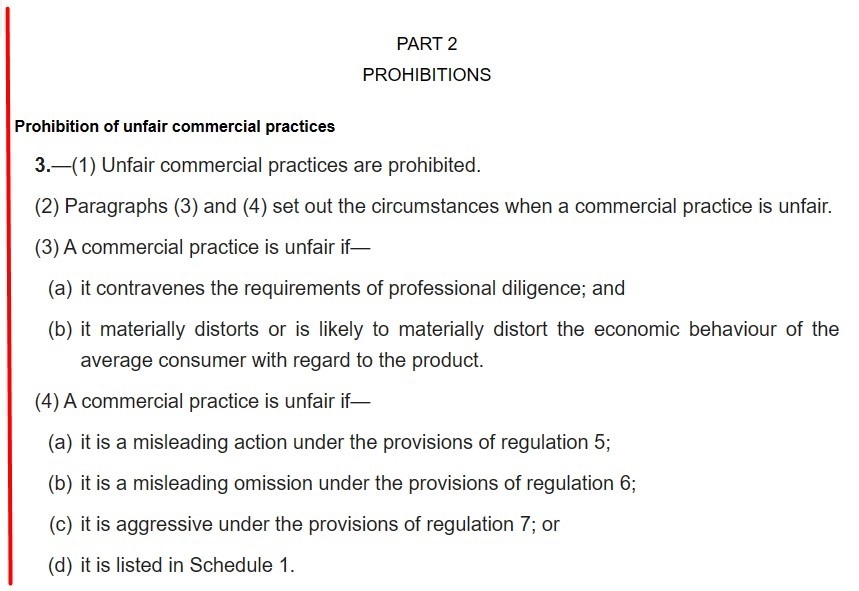
Europe
Europe's main law concerning earnings claims is the European Union's (EU) Unfair Commercial Practices Directive.
To comply with the law, businesses that provide products and services to EU residents must provide clearly written and easy-to-understand information so that consumers can make informed purchase decisions.
As with the UK's CPR, Europe's Unfair Commercial Practices Directive requires companies that cater to EU consumers to refrain from misleading practices.
Misleading practices include:
- Omission (leaving out key information)
- Action (providing false information)
- Aggressive business practices
That means that if you offer money-making opportunities or financial advice to consumers in the EU, then you need to clearly explain everything they need to know to make an informed purchasing decision. You should ensure that you don't misrepresent potential results or leave out any pertinent information concerning users' earning potential.
Your Europe's Unfair commercial practices page explains that EU consumers have the right to receive comprehensive information from the businesses that cater to them. It lets EU consumers know that they are legally protected from misleading and aggressive business practices:
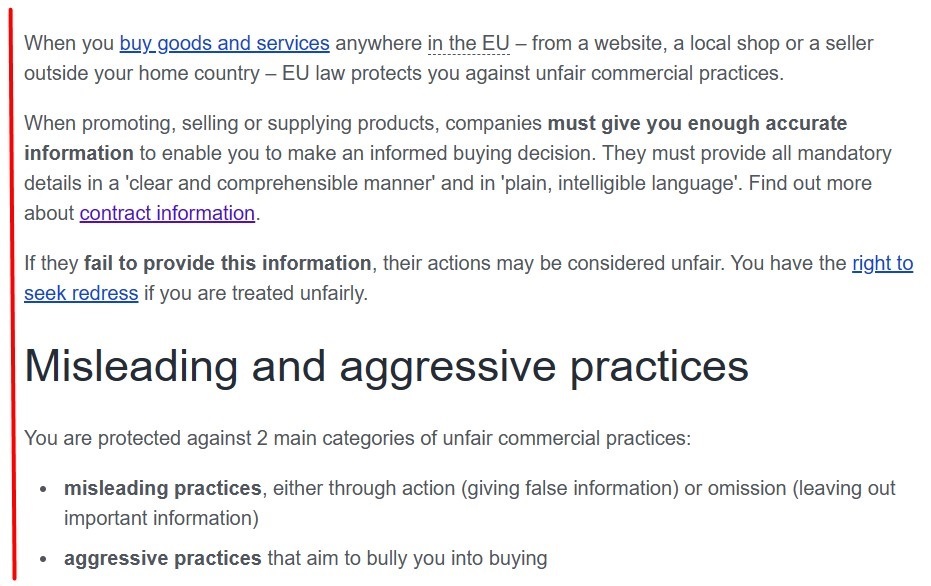
Where Should You Display an Earnings Disclaimer?
You should display your earnings disclaimer and/or a link to your earnings disclaimer where it can easily be found.
One of the best places to put a link to your earnings disclaimer is within your website footer. You can also place links within blog posts, at the top of web pages, within your ads, on your testimonials page, and within your Terms and Conditions agreement (a legal document outlining the rules users must follow in order to use your services).
Website Footer
Most users probably know to scroll down to the bottom of a web page to find legal agreements, and these links are accessible no matter what page of your site users navigate to. While many businesses add their disclaimers to their Terms and Conditions agreement, it's a good idea to create a stand-alone earnings disclaimer link so that users can quickly and easily access the information.
Amy Porterfield maintains a link to her earnings disclaimer in her website footer, alongside links to her Privacy Policy and Terms and Conditions agreement:

The Money Advantage provides links to its legal agreements and disclaimers in its website footer, including a link to its earnings disclaimer:
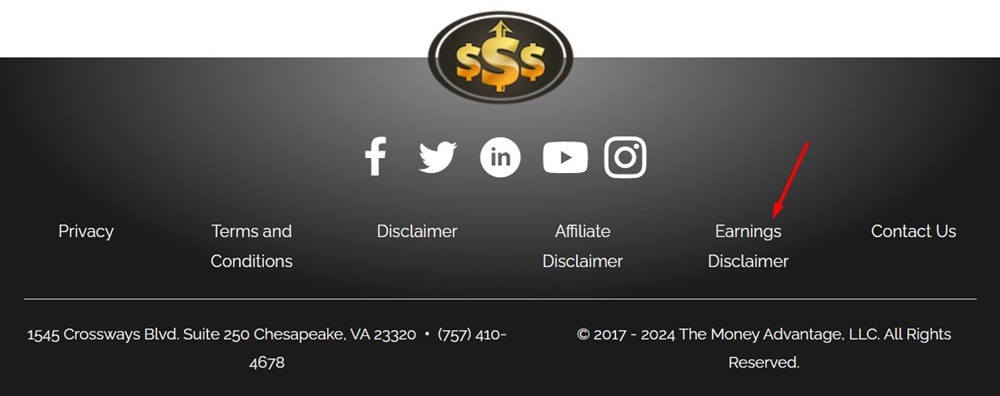
Anywhere You Make Earnings Claims
You should put a link to your earnings disclaimer anywhere on your website where you describe how much money you or past users have made using your product or service or how much new users could potentially make, including:
- Advertisements and landing pages. You should put your earnings disclaimer within any advertisements or landing pages that boast earning potential through the use of your products or services.
- Blog posts/articles. With blog posts or articles, you can put a full earnings disclaimer at the top of the page or post relevant parts of your earnings disclaimer next to earning claims within the articles. Putting your earnings disclaimer next to any earnings claims you make is a great way to ensure that readers understand that exceptional results aren't necessarily typical.
- Testimonial pages. It's important to review testimonials before posting them to ensure that they come from actual users and portray legitimate results. Once you have verified testimonials you can post them, but you should include an earnings disclaimer to let visitors know that past users' financial success is not a guarantee of any other user's future success.
- Terms and Conditions agreement. Many businesses add their earnings disclaimers to their Terms and Conditions agreements. It's a good idea to include all of your disclaimers in one document where users can easily find them, but you should still put links to your earnings disclaimer or the entire content of your earnings disclaimer in relevant places as mentioned above.
Summary
An earnings disclaimer is a statement that helps limit your liability by explaining that you make no guarantees as to how much money users can make by following your advice or using your products, programs, or services.
An earnings disclaimer should contain the following elements:
- An explanation that earnings are not guaranteed
- A list of factors that may affect financial results
- A use at your own risk warning
- An explanation of your warranties policy
- A statement that the user agrees not to hold you responsible for any financial losses
Legal requirements for earnings disclaimers vary by location.
In the United States, the FTC is the primary regulating authority for earnings disclaimers. The FTC requires businesses that provide money-making opportunities to U.S. consumers to refrain from unfair and deceptive business practices, including misrepresenting users' earning potential.
In the UK, the Consumer Protection from Unfair Trading Regulations requires companies that cater to UK consumers to maintain professional diligence and refrain from misleading consumers about their products or services.
In Europe, the EU's Unfair Commercial Practices Directive applies to businesses that offer money-making opportunities or advice to EU consumers. It requires applicable businesses to provide all information consumers need to make an informed purchasing decision in a clear and easy-to-understand manner.
Your earnings disclaimer and/or links to your earnings disclaimer should be conspicuously displayed on your website.
Common places to display your earnings disclaimer or links to your earnings disclaimer include:
- Within your website footer
- At the top of blog posts or within articles about your product or service
- On your landing page
- Within advertisements
- On your testimonial page
- Within your Terms and Conditions agreement

Comprehensive compliance starts with a Privacy Policy.
Comply with the law with our agreements, policies, and consent banners. Everything is included.
